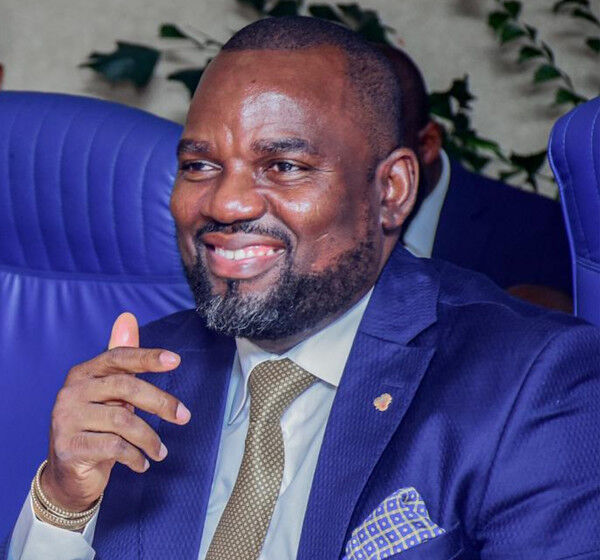
Nigeria’s quest for energy transition, Wednesday, received a boost, as an indigenous firm, UTM Offshore Limited, signed agreements with three technical partners, Kellogg Brown and Root (KBR) UK, Japan Gas Corporation (JGC) and Technip Energies Limited, for commencement of the Front End Engineering Design (FEED) for the nation’s first Floating Liquefied Natural Gas (FLNG) facility. The pacts were perfected in London, United kingdom.
The contract essentially entails conducting for UTM Offshore various studies to figure out technical issues and estimate investment costs for the FLNG facility prior to the Engineering, Procurement and Construction (EPC) phase of the project. Timeline for this phase is 10 months.
The signing is a follow-up to successful execution of the pre-FEED agreement between UTM Offshore and JGC, a leading international engineering design, procurement and construction firm.
The Pre-FEED scope was completed within four months. KBR provided due diligence by conducting a third-party review of all deliverables from JGC during the Pre-FEED phase. UTM Offshore entered into the pre-FEED agreement with JGC and KBR in May 2021.
At the signing, Managing Director and Chief Executive Officer of UTM Offshore Limited, Julius Rone, underscored the fact that like most other nations of the world, Nigeria is working assiduously towards achieving energy transition.
He said the nation’s energy transition necessarily should start with moving from huge dependence on crude oil to gas.
“Like I have said in several fora, for us in Africa, especially Nigeria, energy transition is steeped in harnessing our abundant gas resources,” Rone noted, adding: “At UTM Offshore, we completely agree with President Muhammadu Buhari that given Nigeria’s potential of about 600 trillion cubic feet of gas, the commodity has enormous potential to diversify our country’s economy.”
He explained that the rising global demand for cleaner energy sources has offered Nigeria an opportunity to exploit gas resources for the good of the country.
“We thank the President for making gas development and utilisation a national priority to stimulate economic growth, further improve Nigeria’s energy mix, drive investments and provide the much-needed jobs for our citizens in the country,” he added.
Rone disclosed that UTM Offshore was impressed with JGC’s and KBR’s handling of the pre-FEED component of the FLNG project, hence the resolve to reengage the firms for the main FEED phase.
“JGC Corporation came highly recommended, given the several similar projects the firm had undertaken across the world. Indeed, of the total number of five FLNGs in the world today, JGC Corporation was involved in the design, construction and commissioning of three,” he recalled.
Also speaking, Minister of State for Petroleum Resources, Chief Timipre Sylva, applauded the pioneering efforts of Rone and UTM Offshore, pledging that the Federal Government will continue to support and create the enabling environment for investments, especially in the area of gas development.
“The PIA (Petroleum Industry Act) is already improving the petroleum industry’s reputation, paving the way for new investments, creating jobs, supporting the economic diversification agenda and strengthening Nigeria’s ability to fulfill the world’s expanding energy demand,” he added.
The minister reiterated government’s determination to leverage natural gas as the nation’s transition fuel, with UTM’s Floating LNG Technology as game changer.
President of African Export-Import Bank (Afreximbank), Prof. Benedict Oramah, lauded the tenacious and transparent pursuit of the FLNG project by Rone and his UTM team, pledging the full backing of the institution for the project.
He said: “Nigeria is a gas zone. The country holds the highest reserve of gas in Africa, but for years, we were burning our wealth through gas flaring.
“It is a good thing that President Buhari decided to press the pause button so that Nigeria can optimise utilisation of the country’s gas resources to enhance the lot of the nation and create wealth for the people from what is abundant in the country.”
UTM and Afreximbank had signed a $5 billion Memorandum of Understanding (MoU) for financing of the FLNG in December 2021, with Oramah saying: “The UTM FLNG is one of the projects Afreximbank is very proud of, just like the Dangote Refinery. We are proud to be associated with these two projects in Nigeria.”
Nigeria’s High Commissioner to the United Kingdom, Ambassador Sarafa Ishola, underlined the full backing of government for the project.
“This is one of the occasions that makes us very proud as representatives of Nigeria in other countries,” he said, adding: “Nigeria is committed to climate change and COP 23 and what UTM, conceiving and actualising Nigeria’s first Floating LNG, conforms with energy transition strategy of the Government of Nigeria.”
At the event were heads of regulatory authorities in Nigeria’s oil and gas sector, including Executive Secretary of Nigerian Content Development and Monitoring Board (NCDMB), Simbi Wabote; Chief Executive Officer of Nigeria Upstream Petroleum Regulatory Commission, Gbenga Komolafe and Chief Executive Officer, Nigeria Midstream and Downstream Petroleum Regulatory Commission, Farouk Ahmed.
Top officials of the UTM FLNG’s technical partners, including President of JGC Holdings, Tadashi Ishizuka; Chief Operating Officer of Technip Energies Limited, Marco Villa; Vice President of KBR, Paul Baillie and Head of LNG Operations at Vitol, Steve Brann, committed to concluding the project in a record time.
UTM Offshore Limited is pioneering the development of the FLNG facility in collaboration with LNG Investment Management Services (LIMS), a subsidiary of Nigerian National Petroleum Corporation Plc (NNPC Limited).
The facility, a newly built vessel, will receive gas feedstock from an existing offshore facility, treat it to the required LNG standard, liquefy the gas, store the LNG and offload to LNG carriers.
When completed, the floating LNG would an LNG production capacity of 1.2 mmtpa, Turret and Mooring System, gas pre-treatment modules, LNG production modules, living quarters, self-contained power generation and utilities, as well as capacities for LNG storage and offloading.






